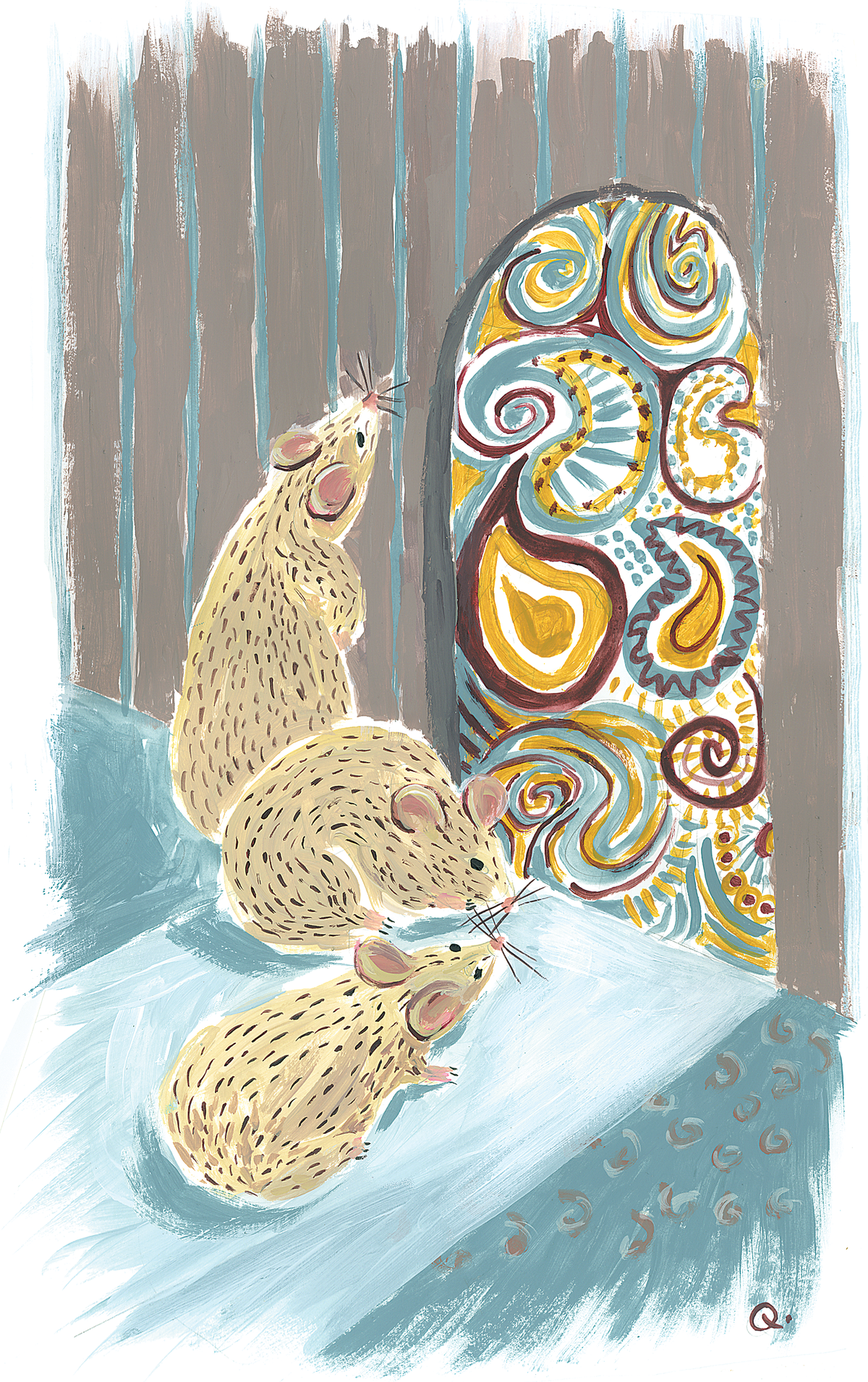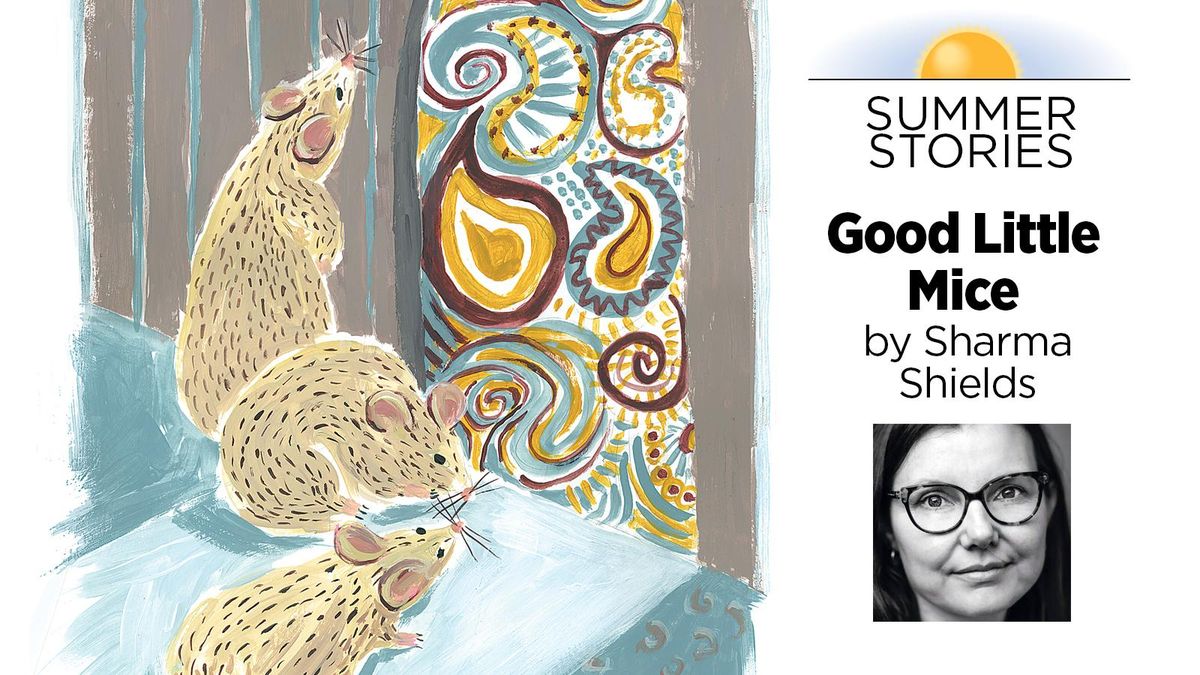Summer Stories: ‘Good Little Mice’ by Sharma Shields
After the offensives, after the riots, the murders, and then – to their surprise – the music, the mother shuttered the windows and locked the doors.
“To keep you safe,” she said.
Her three children blinked up at her from the divan. She switched on a lamp, unplugged the television set. They trailed her into the kitchen for their breakfast. She poured her fear into their breakfast cereal, she stirred her hatred into their Ovaltine.
“A man on the moon,” she said, clicking her tongue. “A war in the jungle. Murderers in the hills. Homosexuals in the streets.”
Her disgust flavored their meals, bitter and sharp, dandelion greens, citrus peels, rose thorns and metal. The children chewed and swallowed and bled.
Soon they wondered aloud, What will happen to us if we go out there?
The mother fell to her knees, grabbed the eldest by the shoulders. Her face was a pale fire of urgency and love.
“If you go out there,” she said, “they’ll harm you. Winged men with bare breasts and razor-sharp talons will pluck you from the earth. They’ll drop you from a great height – your bones will splinter and snap. Warriors made of aluminum and titanium will spit a thick, viscous jelly on you, melting your eyeballs. Wild-haired maidens, violent with drugs and lust, will fall on you and tear you apart piece by piece. They’ll package up your remains and send them off to a cold, lifeless moon just to be rid of you.” Here she paused, her voice catching. “You’ll forget about me, and I you, and there will be no saving you.”
She was so desperate, so sincere. The children loved her. They promised her that they understood, they quit their many questions. They reassured her, putting their little hands on her face and back, Yes, Mama, we will stay, don’t worry, we’ll never leave you.
At first it was joyous: No school, no piano lessons, no routines. Their mother gave them permission to rummage in her drawers and closets, to upend her jewelry box with its sparkling treasures, to explore the dank basement with its old tools and rusted machines, and they reveled in the house’s darkest corners. For exercise, they jogged up and down the big staircase, or they jumped rope in the echoing blue bathroom. One day they threw a ball in the den and broke their mother’s cherished Italian vase. They went still, hearing her anxious footfall. The coral fragments lay like fresh wounds against the beige floor tiles. She would punish them, they worried, she would cast them out. But she did no such thing, only retrieved a broom and swept up the pieces without comment. It occurred to them: We can do whatever we want. There was one rule and one rule only: Stay here.
The days grew long in the dark house. They had always been good, obedient children, but now their confinement released them from such habits. Their behavior worsened. They beat one another with pick-up sticks, they pushed one another down the flight of carpeted stairs, they trapped the cat in a roasting pan in the oven. Arms outstretched, they sailed like gulls through the big house, knocking down picture frames in the hallway, delighting in the sound of splintering wood and glass. Their mother smiled patiently; she cleaned up their messes.
“Nothing can touch us here,” she said, and the children relaxed into her relief. Look at how happy she is, they marveled. They mistook her gladness for their own. They forgot about their brick schoolhouse, playing with friends, the outings to the park with its pretty stone bridge where they’d once seen dozens of small brown frogs leap across the grass like a mud. They locked all of this – the frogs, the memories – somewhere deep inside; they believed in their purported toxicity.
The mother continued to feed them her fear, her horror, her lust for homogeneity. They drank it all down in tall glasses of Tang, scarfed it up on toast dripping with Chicken a la King, licked it out of the center of warm Pop-Tarts. Ravenous, they consumed whatever she gave them. Their small bellies grew taut with her terror. When the mother left for the store, they wailed at the slicing brightness; they sobbed with relief when the many locks clicked shut behind her. Now and again, they overheard the awful noises of the exterior world: a shriek of delight, a car backfiring, a marching band – obstreperous, menacing – with its throbbing percussion and screaming horns. Their mother had taught them that even music was dangerous, so they cowered against the walls, holding one another, sobbing. When the silence returned, so did their ease.
One evening the mother returned from the store with a bar of chocolate.
“You’ve been good little mice,” she said, and she broke off a piece for each of them.
They ate, remembering a long-dormant sweetness.
The next morning, served breakfast by candlelight at the laminate table, the middle-child pushed her plate away. She hadn’t taken a bite.
“If you’re unwell,” the mother said, “then back to bed.”
The middle child met her mother’s eye with unusual frankness. She was not as wild-eyed with fear as her siblings, but there was doubt there, a cracking open of a question.
She rose, hesitated a moment as if to say something, but then seemed to decide against it. She went to bed.
Later she emerged to play with her brother and sister.
“What’s wrong with you?” they asked her.
She ignored the question, took down a board game, Candyland, and began unpacking it quietly in a corner.
“She’s sick,” the brother said.
“She’s stubborn,” said a sister.
“She’ll feel better after she eats,” the brother concluded, and then he and the younger sister raced off to flood the bathroom, to smash the dishes, to carve their names into the kitchen cupboards with the mother’s sharpest knives.
The middle child refused to eat at the next meal, and at the next. Days went by where she did nothing but stare sullenly at the heavy window coverings. She studied them as if she could see clean through them. They wondered what she imagined there: Blackbirds, nuclear clouds, hippies, starlight, people electrified by drugs or love or napalm. Could she see the winged men? The warriors? The bands of wild cannibal women? The middle child sipped at water and nibbled at small hunks of bread, but only if her mother hadn’t smeared them with the fatty cheese of her hatred. The daughter’s eyes bulged in her bony face, her ears seemed to expand as the rest of her shrank. She did look like a mouse now, trembling, aware, hungry, but not for what the mother offered her.
At night, their mother safely snoring in her own room, the brother and sister gathered around the middle child’s bed.
“What’s wrong with her?” demanded the sister.
“I’m worried about her body,” said the brother.
“We’ll force feed her canned peaches,” suggested the sister. “We can easily pin her down.”
Their voices rose and fell, arguing, wondering. They talked about her as if she wasn’t there at all.
The middle child closed her eyes, turned away from them. She was both weak and powerful. In the dimness of the lamplight, translucent with hunger, her body shone.
One day she didn’t come down to breakfast at all. The siblings went to check on her and found her bed empty, the sheets disheveled, the comforter puddled on the floor. They looked in the closets and the bathrooms and the basement, all of the usual hideaways, and found no trace of her. Their mother took up the search, checking the windows and doors: They were still latched from the inside, deadbolts and chains secured. The children held their breath, their mother disappearing behind the cumbrous drapes. Finally, she emerged from the last window covering, sighing with relief.
“She must be in the house,” she said. “She’s still safe.”
The children looked at one another, disquieted. They wondered if there were other ways to leave the house: chimney flues, air ducts, the stinking wet pipes. Their sister had been so small at the end, so diaphanous, she might have slipped like a piece of paper beneath the slat of a door frame or through a crack in the wall. How effortless it would be for her to disappear into the chaos of the outside world, a world bent on change no matter how static they remained, how defensive, how ensconced. They pictured her there, trodden and torn and dirtied. They shuddered.
The mother must have seen their concerned expressions. She knelt and opened her arms to them, drawing them close. The two children huddled there on the carpet with her, arms laced, knees touching, their only comfort their togetherness.
“All is well,” the mother said. “The doors are locked. The windows secured. We’re safe here. Nothing has changed.”
They almost believed her. They started to relax, told themselves they could be happy here, smothered by what they were told was love, but then the sister sat upright, startled, and then the brother did, too, palm cupping his ear, and soon even the mother ceased whispering and went very still, listening.
There was a pause, but then the noise started up again: A sound in the walls, a scratching, a rending – tiny sharp claws scraping the plaster, keen fangs tearing at the insulation – faint at first, but then more and more determined, whatever creature dwelling there hellbent on escape or entry.


